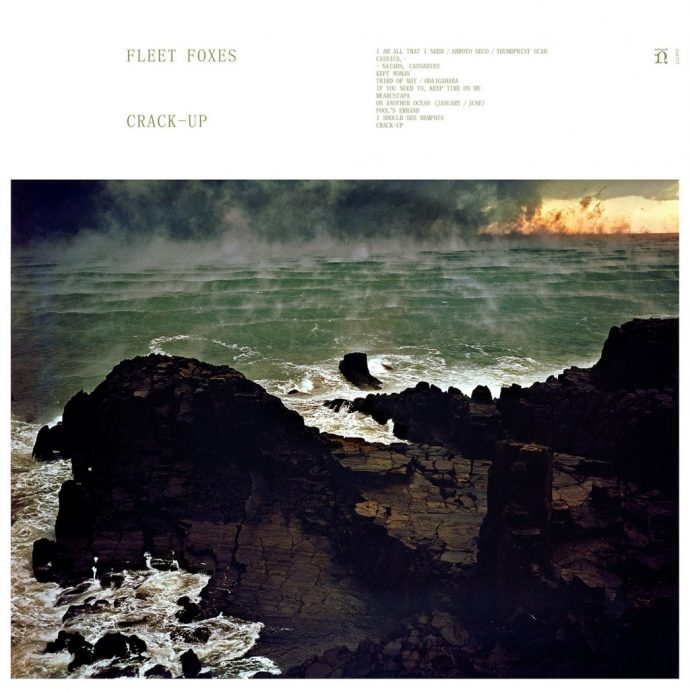Fleet Foxes first album in 6 years, Crack-up, is a delightful smorgasbord of folk fusion. Like their previous albums, the band smashes vintage folk and psych-pop sounds together, but have seemed to hit their stride with Crack-up, infusing different vocal personalities besides the reverb-heavy harmonies listeners know and love from Sun Giant. The album displays some incredible mixing chops from Phil Ek, as the album fluctuates through different moods and emotions, often within the same song.
Through all the oscillations, they still maintain excellent pop sensibility, which is no easy feat. An expected transition from angsty Helplessness Blues, the first song, “I Am All That I Need / Arroyo Seco / Thumbprint Scar,” begins very quietly, with whispering vocals recorded at a high volume and thoughtful lyrics croaking, “Mute at midnight she might look like the answer // but I’m all that I need.” This section quickly builds to shuffling folk that listeners are used to from Fleet Foxes, with the 2010s indie rock harmonies, only to break back down again with samples of waves and clapping.
From here, Fleet Foxes totally detaches from the happy-go-lucky antics of their self-titled EP. Commentary on police brutality, (“Cassius, -”) Robin Pecknold references militant police activity, with the lyrics, “Songs of masses, passing outside // all inciting the fifth of July,” which is, of course, about the riots following the shootings both Philando Castile and particularly Alton Sterling, “when guns for hire open fire // blind against the dawn.” Still maintaining poetic form within early Stereolab krautrock synths, Pecknold uses simple words and rhyme to convey the backwards state of the U.S. that he perceives as a citizen.
Pecknold continues the trajectory of social commentary with the next song, “- Naiads, Cassadies,” as well, this time condemning the objectifying way women are viewed and pressing that “you’re not adrift, // you’re not a gift, // you know you’re not a flower,” and instead making the comparison to powerful elements like fire and water. “Kept Woman,” refers to a woman who exchanges sexual favors for food and housing, and within this song Pecknold tells the story of “Anna,” who is lost and “ossified.” The overall feel is of softness and understanding, far from criticizing Anna’s character. Along with the references to elemental strength, as the album’s cover would suggest, much of the imagery that ties the songs together is ocean imagery; the constant reminder of drowning, like in “Mearcstapa,” and “On Another Ocean,” (“on an open sea,” and “the foam doesn’t sing”).
Within the second half of the album, the songs are more conventionally pretty and compositionally simple than the first half. In “Fool’s Errand,” the listener hears Pecknold grappling with his own disillusion. Relenting from previous albums’ optimism, and even from the previous songs’ understanding of self-reliance, the lyrics ring out, “life will repeat, vision I see, // the mouth and the teeth // and that’s fine with me. // What have I got if not a thought?” One of the more relatable stanzas in the album, there is a lot that feels out of our control, but regardless, we have the ability to think, and question things.
As Pecknold sings in the penultimate and orchestral song, “I Should See Memphis,” he’s “got [his] teeth in it,” and “won’t let go,” which seems, to this listener, like a promise to keep questioning and searching for answers and ways to improve our world. All in all, the album is the band’s most stylistically complex to date. Pecknold’s writing has become more personal, and the compositions around him cater to the emotional rise and fall lead by the vocals. Crack-up displays sonic maturity as compared to previous albums, and yet still caters to the relatable angst that many are feeling now in 2017.
Rating: 8.0/10

